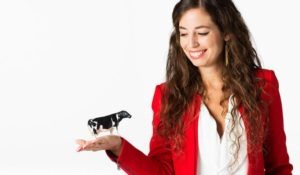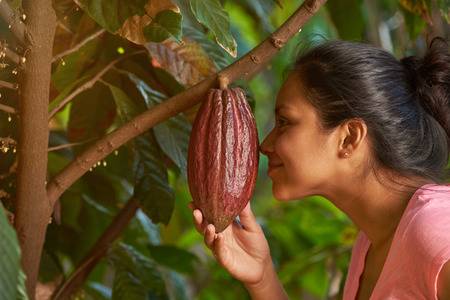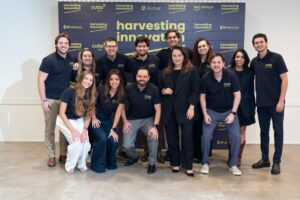Forbes has been having a field day (or week) with a slew of women-centric stories, making their way around social media – the gem being their piece on how 2019’s women of The Forbes 400 are the wealthiest they’ve ever been, with a combined net worth of $429.7 billion, up from $330 billion in 2018. Another piece I particularly liked was on Formula 1 racer Tatiana Calderón – and how she’s poised to be the first woman to participate in 43 years – demonstrating her tenacity to conquer a male-dominated sport. Much like Calderón’s battle against gender equality, women in the startup space have also been fighting the discrepancy between themselves and their male counterparts. Gender equality is as relevant an issue in agri-foodtech as any other industry, which our recent report highlighted, and we were thrilled to see Forbes writer Laura James pick it up too.
Read on for our Q&A with two female leaders in agtech – we’ll be speaking to Mariana Vasconcelos is CEO & founder of Agrosmart and Victoria Alonsoperez, founder of Chipsafer.
Snapshot: Women in business
Source: Fortune, Kiva, Toolbox Creative |
In agri-foodtech, just 7% of deals and 3% of the record-breaking volume of dollars invested in the sector in 2018 went to female-founded teams, according to the report released by AgFunder, Karen Karp & Partners and The New Food Economy, in collaboration with S2G Ventures. The report also surfaced that female founders in the sector face more skepticism, loaded questioning, and smaller commitments from investors than their male counterparts.
Check out our coverage of that report, here.
Forbes’ Bonnie Chiu uncovered that the funding discrepancy between men and women was larger in the greater startup picture. She noted that female founders received only 2.2% of venture capital dollars in 2018. Chiu also highlighted how access to finance is a challenge for female entrepreneurs across the world, with nearly a billion women having no access to credit or financing options. However, she gave a shout-out to non-profit micro-loan agency Kiva, which has rocked that boat. Since its inception in 2005, Kiva has deployed more than $1 billion in microloans to 2.7 million female entrepreneurs across 94 countries – many of which are in developing nations across Asia, Africa and South America.
Over in AgTech, the industry’s pay gap tells a similarly ugly story. Women make on average 61 cents to the dollar for every dollar compared to their male counterparts, according to Toolbox Creative. That’s less than the all-industry average of 81 cents to the dollar. In agriculture more broadly, women make up about half of the world’s farmers, but consistently receive a smaller share of land ownership and farming inputs, according to the World Bank. In April 2018, Agrilyst CEO Alison Kopf released an open Google doc on LinkedIn with the names of 75 “Inspirational Women in Ag.” The number of entries has since extended to nearly 500, at the time this story was published.
(More broadly in food, Danielle Gould from Food+Tech Connect has a similar G-sheet with 690 female innovators on it and various other resources.)

But what is sentiment on the ground? AFN spoke to two female trailblazers making waves in macho Latin America. Mariana Vasconcelos is CEO & founder of Agrosmart, a Brazilian startup that uses big data and analytics to help farmers increase the efficiency and sustainability of their operations across a diverse range of crops.
The 27-year-old is the owner of a growing list of accolades including a position on Fast Company’s 2019 list of “Most Creative People in Business, graduating from NASA, while picking up MIT and Forbes awards along the way. Also, in 2018, the World Economic Forum recognized Agrosmart as one of the world’s most innovative companies. Agrosmart recently raised a $5.8m Series A for its digital tool, that serves high profile companies Coca-Cola & Cargill.
Check out our previous interview with Vasconcelos on her company’s Series A, here.

Another female leader that will be sharing her insights is Victoria Alonsoperez, founder of Chipsafer. Hailing from Uruguay, her startup relies on IoT to monitor cattle, using tags to measure vital signs and reduce cattle theft. It recently launched successful pilot programs in Namibia and Kenya.
Alonsoperez has a LinkedIn profile of equally stratospheric proportions. She’s an appointed Young Global Leader at the World Economic Forum and the United Nations. Mirroring her peer Vasconcelos, she’s also attended International Space University, where she co-designed an award-winning medical experiment for astronauts.
Find out how Chipsafer could help the world fight the African Swine Fever epidemic here.
Joe Gan: How is it being a female leader in agtech in Latin America? Walk us through your story.
Mariana Vasconcelos: Being a female leader in Latin America has its challenges like everywhere in the world. Doing it in the ag and tech sectors adds a lot of difficulties. Initially, I faced a lot of resistance from farmers and agronomists, in order to prove that I understood technically about agriculture and that I knew what I was doing.
But once I broke down that barrier, farmers started treating me like a daughter. And that helped me in the journey to better understand their needs and develop Agrosmart’s products. However, they didn’t want to negotiate with me. We learned how to handle those matters. And I find my main challenge still lies with middle management execs from agriculture multinational companies. My thoughts around it are that we, as women, need to be persistent and continue showing the results of our work. Don’t give up when someone says no or humiliates you. Just keep doing it, until they can’t shove you aside any more.
Victoria Alonsoperez: I have been passionate about space since I was four years old and my dream was to have an aerospace career. However, Uruguay had no space industry, so pursuing a career here was not easy. The space industry seemed something very far away from Uruguay, so my classmates would make fun of me and I was told several times that I would not make it.
Fortunately, I had an amazing family who always encouraged me to follow my dreams. While I was in school, I took astronomy courses and watched as many documentaries as I could about space. I even did a science project about the colonization of Mars when I was 14 and presented it at the Science Fair, the Planetarium, and the State University Science Faculty. I studied electrical engineering and then got a scholarship to attend the International Space University, where I could finally develop a space career. I specialized in small satellites, and while working in that industry, I realized that I could use space technology to positively impact people, and I became an entrepreneur.
Being an entrepreneur is exciting but hard at the same time. I made many mistakes and learned a lot. I think that having people in the past telling me that I would never have a space career helped me build resilience and have confidence in myself. And that’s so important for being an entrepreneur. Another big help was being surrounded by many mentors and role models.
I don’t think that it was more difficult for me because of being a woman. I love being an entrepreneur from Latin America. I had many people ask me in Europe or the US how I came up with the idea of Chipsafer, and why I did a project for cattle. My answer is because I am Uruguayan, and as an Uruguayan, I know how important cattle is for my country. I witnessed firsthand how much damage an outbreak of a disease in the cattle could have. So, years later, while I was working with tech that I thought could help farmers, I created Chipsafer.
Do you think women are underrepresented in the workplace globally? What about Latin America?
Vasconcelos: I do, but that is changing fast. We have more and more women in ag and in tech. In agriculture, they are taking their place in the farms and there is even an annual women in agriculture convention, as well as regional and national groups for supporting women in agriculture in Argentina and Brazil.
Alonsoperez: Every year I see more women becoming startup founders or part of a startup founding team. These women then become role models or mentors to other women that want to start their own venture and more women become founders. So I think in the future there will be as many female as male founders. There are many areas in which there are still very few women, such as STEM (science, technology, engineering and mathematics). I am an electronics and telecommunications engineer and I took university classes in which I was the only woman. However, I think that there is a lot being done to promote the study of STEM for young women and girls globally.
How can companies help improve the visibility of women in high-powered positions?
Vasconcelos: I don’t believe we need gender quotas. I believe we need to define better our values and hire people according to them. It is important to be aware of our bias, so in a hiring process, it’s good to stop and think whether we have enough diversity in that group of candidates. I also believe it is our responsibility to educate our kids to respect all women.
We need role models. Every time I see a successful woman, I feel energized and believe I can make it too. In the same way, I try to serve as a model for other girls. I also believe is important for us to communicate the success stories so we can get to know these role models. As women tend to speak less about how good they are at something, many great stories remain unknown.
At Agrosmart, we don’t have a problem attracting women for different positions, including those that are in STEM. I believe that is because they feel comfortable as there are other women in leadership positions. I also think one of the most important policies in a company is to consider rights also for the father on paternity leave, giving women the choice to continue working and the possibility to have support splitting the tasks between the parents.
Alonsoperez: I think everyone should be given equal opportunities. Many times it happens that women do not apply to higher positions because they lack confidence or because they think that they do not have the right qualifications. One thing that I noticed is that men are more confident when it comes to their self-worth. Women should be actively encouraged to apply for higher positions.
I recently took a course on female entrepreneurship, which was very useful. Companies could offer their female employees training and workshops to help boost their confidence in the workplace. Still, I do not think that a hiring rule such as 50-50 gender ratio is a solution. The best candidate should be hired for a position regardless of gender. In my opinion, when hiring a candidate, gender should not be considered at all. A person should be hired because is the best for the job not because it will fill a gap. We have to be extremely careful to not incur positive discrimination which can generate a terrible work culture. Everyone should be given equal opportunities.
Know a female leader AFN needs to speak to? Drop me a note at [email protected].





